ATLANTA, GA — Oct. 24, the Georgia Supreme Court upheld the state’s “heartbeat” law, known as “Living Infants Fairness and Equality (LIFE) Act,” protecting unborn babies with a “detectable human heartbeat,” which can be detected as early as six weeks of pregnancy.
The 6-1 ruling reverses a lower court’s decision to nullify the law because it was enacted during the era where abortion was recognized as a constitutional right by the U.S. Supreme Court’s 1973 Roe v. Wade decision. The Georgia’s High Court decision allows the state’s LIFE Act to stay in effect while litigation continues in a lower court.
The LIFE Act, which bans abortion with very few exceptions, was signed into law in 2019. In July 2020, a federal court struck the law down as unconstitutional under the binding precedent of Roe where states could not legally stop abortions during a woman’s first trimester.
However, in June 2022, the U.S. Supreme Court overruled Roe with the Dobbs v. Jackson Women’s Health Organization decision stating that Roe was “egregiously wrong from the start” and “[t]he Constitution does not confer a right to abortion.” Georgia then appealed to the Eleventh Circuit Court of Appeals which restored the LIFE Act since there was no longer any constitutional protection for abortion.
Pro-abortion activists then filed a new lawsuit arguing to the Georgia Supreme Court that the LIFE Act should have remained struck down because legislators in 2019 ignored the law of the land at the time when they crafted and enacted it.
However, the Georgia Supreme Court reasoned the LIFE Act is constitutional now.
In the majority opinion, Justice Verda M. Colvin wrote, “The trial court erred in relying on overruled decisions of the United States Supreme Court to conclude that portions of the LIFE Act violated the United States Constitution when enacted in 2019. The same United States Constitution governs today as when the LIFE Act was enacted, and Georgia courts are required to look to the United States Supreme Court’s now-controlling interpretation of the United States Constitution when determining whether a statutory law violates that Constitution.”
Justice Colvin made clear that the U.S. Supreme Court has no power to supply or change “the independent and fixed meaning of the United States Constitution.” Therefore, Georgia’s High Court does not view a difference in the constitution’s independent meaning between 2019 and today “nor does it give overruled judicial opinions binding effect after the date they were overruled.”
Justice Colvin wrote, “Because Dobbs is controlling precedent on whether the United States Constitution confers a right to abortion, and because the parties and the trial court do not dispute that the LIFE Act complies with Dobbs, it follows that the LIFE Act did not violate the United States Constitution when enacted in 2019.”
The pro-abortion activists also argued to the Georgia High Court that the law violates due-process and equal-protection rights of the Georgia Constitution. However, the Court did not offer a decision on those claims and remanded the case to give the lower court the first chance to rule on those issues. Liberty Counsel will file an amicus brief in the case.
The ruling makes the LIFE Act both valid and enforceable and alleviates lawmakers from having to draft and enact a new law.
At least five other states have six-week heartbeat laws, such as Florida, Iowa, Mississippi, Ohio, and South Carolina. However, the laws in Iowa, Ohio, and South Carolina are blocked amid legal challenges. At least 16 other states ban abortion at conception, such as Alabama, Arkansas, Idaho, Indiana, Kentucky, Louisiana, Missouri, North Dakota, Oklahoma, South Dakota, Tennessee, Texas, Utah, West Virgina, Wisconsin, and Wyoming.
Liberty Counsel’s Founder and Chairman Mat Staver said, “We continue to see the fruit of the righteous U.S. Supreme Court decision to overturn Roe v. Wade eliminating so-called abortion rights. Every person has an inalienable right to life. Pro-life laws protect innocent unborn babies, and it is time for all states and courts around the nation to follow suit and make the womb a safe place again.”
For more information about state laws protecting unborn life, visit Liberty Counsel’s website.












Leave a Comment
You must be logged in to post a comment.